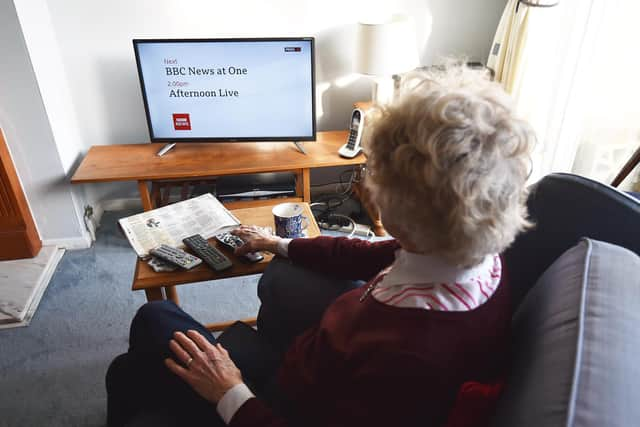Thousands in Bedford to lose free TV licence
and live on Freeview channel 276
Thousands of pensioner households in Bedford will soon be receiving a letter that ends their automatic right to a free TV licence.
Charities and campaigners have said the change will be devastating for many older people, especially as a second wave of Covid-19 could make access to television a “lifeline”.
Advertisement
Hide AdAdvertisement
Hide AdA House of Commons Library analysis reveals 8,310 households with someone aged 75 or over in Bedford will cease to qualify for a free licence under the new means-tested scheme.


The new rules came into force on August 1 and mean only households with someone in the age bracket who receives Pension Credit will be eligible.
Previously, anyone aged 75 or over was exempt from the charge, which stands at £157.50 per year.
Around 3.2million households across Great Britain could lose out on the benefit, according to the findings.
Advertisement
Hide AdAdvertisement
Hide AdThe BBC was given responsibility for funding free TV licences as part of a deal with the Government in 2015.
But the corporation says it would cost £745 million a year to foot the bill, which it could afford only by shutting down numerous channels and radio stations.
Jan Shortt, general secretary of the National Pensioners Convention, said she would not stop campaigning to have the decision overturned.
She added: “This is devastating for all those people who will now have to find the extra money. We’re particularly concerned about those who are only just over the Pension Credit limit.
Advertisement
Hide AdAdvertisement
Hide Ad“They’re the ones who are already making difficult decisions about how they spend their money.
“For those people their TV is a lifeline, particularly when we might have a second wave of the coronavirus.”
She added: “We will continue to argue with the Government – it’s their responsibility.”
Caroline Abrahams, charity director of Age UK, said it was “deplorable” that any older person should have to choose between cutting spending on essentials, giving up TV altogether, or watching without a licence and breaking the law.
Advertisement
Hide AdAdvertisement
Hide AdShe said she hoped the BBC and the Government could find a way to “keep TV free for the oldest in our society”.
Across the East of England, an estimated 343,730 pensioner households will need to buy a licence.
The analysis compared figures on households with someone aged 75 or over receiving Winter Fuel Payments – a universal benefit – with Pension Credit claims in November last year in which the main claimant was in the age group.
The BBC said it is sending letters to people asking them to confirm their eligibility to continue to receive a free licence, or to pay from August 1.
Advertisement
Hide AdAdvertisement
Hide AdA BBC spokeswoman said: “It was the Government who decided to stop funding free TV licence fees for the over-75s. The BBC isn't making any judgements about who is or isn’t poor, as the Government sets the criteria for Pension Credit eligibility.
“Our focus is now on making the transition as safe and easy as possible for all older people.”
She added that 800 call centre staff were working to support customers.
A Department for Culture Media and Sport spokeswoman said: "The BBC agreed to take responsibility for the over-75 concession in 2015 in return for a substantial boost to its income.
Advertisement
Hide AdAdvertisement
Hide Ad“It decided to restrict the concession to only those in receipt of Pension Credit, and must now look urgently at supporting those affected and using its substantial £4 billion licence fee income to deliver for audiences of all ages, including by making efficiencies."